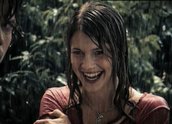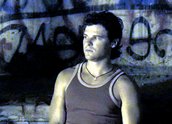


West (2007)
Synopsis
Pete (Khan Chittenden) and Jerry (Nathan Phillips) are cousins and best friends, going nowhere in the west of Sydney. They are unemployed and shiftless – bored, drunk and stoned most of the time. When Jerry gets a girlfriend and a job at a fast food chicken outlet, Pete moves from selling small amounts of marijuana to selling harder drugs, supplied by an older friend Steve (Tim McCunn). Jerry’s new girlfriend Cheryl (Gillian Alexy) responds to Pete’s obvious interest; they begin an affair behind Jerry’s back. All of them are now using Pete’s free drugs. When Pete is attacked for the second time by a local thug (Anthony Hayes), Steve and Cheryl help him beat the guy up. The consequences are more serious than any of them could have imagined.
Curator’s notes
Daniel Krige began writing West at the age of 16 in 1986. It took him 20 years to get the film made, during which time the script underwent many changes, but West still has a strong sense of immediacy and lived experience. Krige has said he started writing out of frustration that none of the films he was watching reflected anything of the lives of himself and his friends, growing up in Sydney’s west. Most of the events in the film happened to people he knew, including the suicide of his own brother. This authenticity is one of the film’s strongest assets. West gives us access to stories that are rarely told in the mainstream media, except in the most derogatory terms. Pete and Jerry are flannelette shirt-wearing ‘westies’, drunken and stoned losers – the kind of young men who end up on current affairs programs about ‘dole-bludgers’ and ‘welfare cheats’. West makes them human, without resorting to clichés or excuses. We learn very little about their home lives, beyond the fact that they are cousins and that Pete’s mother is dead. Krige doesn’t censor their dialogue either: these guys talk in horrible terms about women and sex. Their whole conversation revolves around it, and not in a good way.
In one sense, Krige sets out to tell an old story – two young men are friends, until they both fall for the same woman – but that doesn’t give any sense of the film’s reality or depth or its haunting emotionalism. Other Australian films have sprung from this milieu or visited it (see on this site – The Boys, The FJ Holden, Idiot Box, Little Fish), but West creates a nocturnal version of an ordinary hell which is almost dreamlike. Boredom and drugs combine to create situations in which people do terrible things or take terrible risks – and they barely remember them the next day. The thirst for a sensation, a peak experience, drives them to crash cars, get laid, or even beat someone senseless with a length of pipe. West is like an Australian version of Martin Scorsese’s Mean Streets, except that it’s more subterranean. These kids hang out in culverts and tunnels rather than the streets. That’s how they see themselves, almost like modern urban cave dwellers.
In his debut feature, Krige demonstrates good skills with the performances. Chittenden, Phillips and especially Gillian Alexy give their characters great reality. A new generation of talented young actors has emerged in Australian cinema since 2004, in a series of gritty, realistic films that seek to connect more directly with what’s going on in people’s lives in contemporary Australia. The films are mostly low budget and their box office appeal varies, but there are encouraging signs in the relative success of films like Three Dollars and Look Both Ways in 2005, and Somersault in 2004.
- Overview
- Curator’s notes
- Video 3 clips
- Principal credits
- Find a copy
- Make a comment
- Add your review



